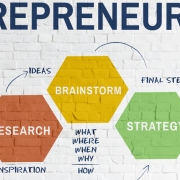On November 1, 2018 we introduced the concept of the Poetic Justice Warrior. It is an abstract idea that honors certain individuals whose choices and actions are guided by rationally chosen principles. One week later we inducted our first member into the Poetic Justice Warrior Society, the 18th century classical economist Jean-Baptiste Say, the man who wrote the textbook for the prosperity of the 19th century and beyond.
On February 20, 2019, we released the Poetic Justice Warrior Society Manifesto, identified the foundational principles of its members, and proposed behaviors that lead to life-enhancing achievements that benefit everyone. Because the Manifesto features twelve behaviors and philosophical principles, twelve individuals have been selected who are exponents for the value system that drives their heightened sense of reality. As you read this celebration of life with the benefit of unprecedented personal liberty, please find happiness in your pursuit of freely chosen values during this new year.
Choices and Actions
Behavior can be motivated by attraction to a positive or avoidance of a negative. Focusing on positive values requires effort, and is the first big step to rational action. Left alone, it evolves into the economic way of peaceful human progress. Avoidance of disvalues is a different motivational system. It is rooted in fear, can be destructive, and possibly threaten our values. Left unchecked, it devolves into the political way of authoritarian control.
The primary behavior for human survival is Reason. It is the power to think, the process of logic, and the formation of rational principles. As such, we lead with Henry Hazlitt as our greatest advocate for volitional human thought. Hazlitt not only bestowed mass audiences with the positive values of the economic way through his iconic Economics in One Lesson, he educated us about the disvalues of the political way with humor, not fear.
The primary behavior for human happiness is Purpose. It is productive work that integrates reason and other personal values. Whether we create value as inventors, firemen, scholars, diplomats, scientists, librarians, real estate developers or journalists, producers are the cornerstone of civilization. The titan among the Enlightenment’s giants, Benjamin Franklin, was all of these.
The primary behavior for human flourishing is Pride, and it must be earned. It is confidence in our ability to achieve our values, the spiritual reward for doing so, and its outward behavior is independence. We own our lives, are responsible for our judgments, and our exemplar is the extraordinary teacher Marva Collins.
I do what I do very selfishly. I wanted to create citizens in my own school whom I would want as my friends, whom I would want as my doctors, because they are precise. They take pride in what they do.
The Victories of the 19th Century
According to its author, the purpose of the Declaration of Independence was “to be an expression of the American mind.” The thinker in search of Evidence, the one who derived purpose for human life on earth was the late 17th century philosopher John Locke. His radical ideas triggered The Great Upheaval – the failed “enlightened despotism” in Russia, the failed French Revolution, and the successful “revolution of the mind” in America in the late 18th century.
If man be lord of his own person and possessions, equal to the greatest, subject to nobody, why will he part with his freedom? Why will he give up this empire, and subject himself to the dominion and control of any other power?
Ultimately, the stunning individualist, socio-economic, and artistic victories of the 19th century can be attributed to Enlightenment radicalism. It starts with the first rock star and software pioneer who set the stage for Romanticism in 19th century art, Ludwig van Beethoven. Supremely independent, he was able to integrate his sense of the human condition, both heavenly and terrestrially inspired, into magnificent compositions that inspire human flourishing.
Frederic Bastiat was a life-long champion of Say’s Law of Markets. During a career as a politician and economic journalist, Bastiat became famous for his pamphlet titled The Law. In it he describes the positive values of Capitalism, and directly confronted the disvalues of socialism and political overreach with satire and sarcasm.
Frederick Douglass is the uniquely American self-made man who combined the 19th century’s victories of individualism, capitalism, and romanticism in his own pursuit of happiness, and he fought vigorously for the same opportunity for all African-Americans everywhere. He refused special treatment for anyone, only equal Justice under objective law. As he declared at the 1893 Chicago World’s Fair,
There is no Negro problem. The problem is whether the American people have honesty enough, loyalty enough, honor enough, patriotism enough, to live up to their own Constitution.
Philosophy, Who Needs It?
The academic discipline whose ideas are most needed in everyday life is the one whose concepts are the most abstract. It exists as perceptions, concepts, logic, propositions and principles. It is philosophy, and everyone acquires their personal philosophy randomly or willfully. The latter requires effort and is rare. For ease of understanding, it helps to divide philosophy into categories, give examples, and highlight people who have worked successfully to change our world in profound ways.
It makes sense to start with Theories of Knowledge. Today we know it as the scientific method of observation and precision. Historically it began in ancient 5th century BC Greece. The catalyst for Aristotle’s reason to be resurrected and coalesced into Christendom was St. Thomas Aquinas. His application of inductive reasoning, and completion of Summa Theologica in 1274, were the primordial soup of modern Western Civilization.
Metaphysics has to do with the nature of reality, matter as the primary of existence, and the application of human intellect to solve their mysteries. We focus on inventors who have engaged the physical world, transformed nature, and created immense value. The invention that became the neural connection between Aquinas, the Late Middle Ages, and the Great Upheaval was the printing press created by Johannes Gutenberg.
Aesthetics is not so much a branch of philosophy as it is the integration of abstract principles into a philosophical theme. Great romantic art is the representation of some of the artist’s highest values. The literature of Victor Hugo is a marvelous expose of Hugo’s sense of life. His range includes the heights of virtue and the depths of cruelty. Reading Hugo educates students about something exceedingly rare in today’s culture – human souls with gravity.
Ethics is the branch of philosophy that governs our relationship with each other. As World War I wiped out the 19th century ethical achievements of individualism and limited government, collectivist ethics gave rise to 20th century totalitarian regimes in Russia, Germany, and China. The resulting mass atrocities, such as the Soviet Great Terror, were emotionally and convincingly described by poet Anna Akhmatova.
Politics is our relationship with society. Although economics is a distinct discipline, it is frequently mixed with politics because economic freedom requires political freedom. They are inextricably combined over the issue of property rights. Our greatest exponent for the primacy of property rights, and the economic way over the political way is Austrian economist Ludwig von Mises.
His epic Human Action is “the most scientific defense of human freedom ever published. Mises’s book is the best defense of capitalism ever written.” Today is the first day of our “Roaring 20s.” May this Poetic Justice Warrior Manifesto inspire readers to find new resolve for challenging personal values, develop principles for human action that will achieve them, and roar!













